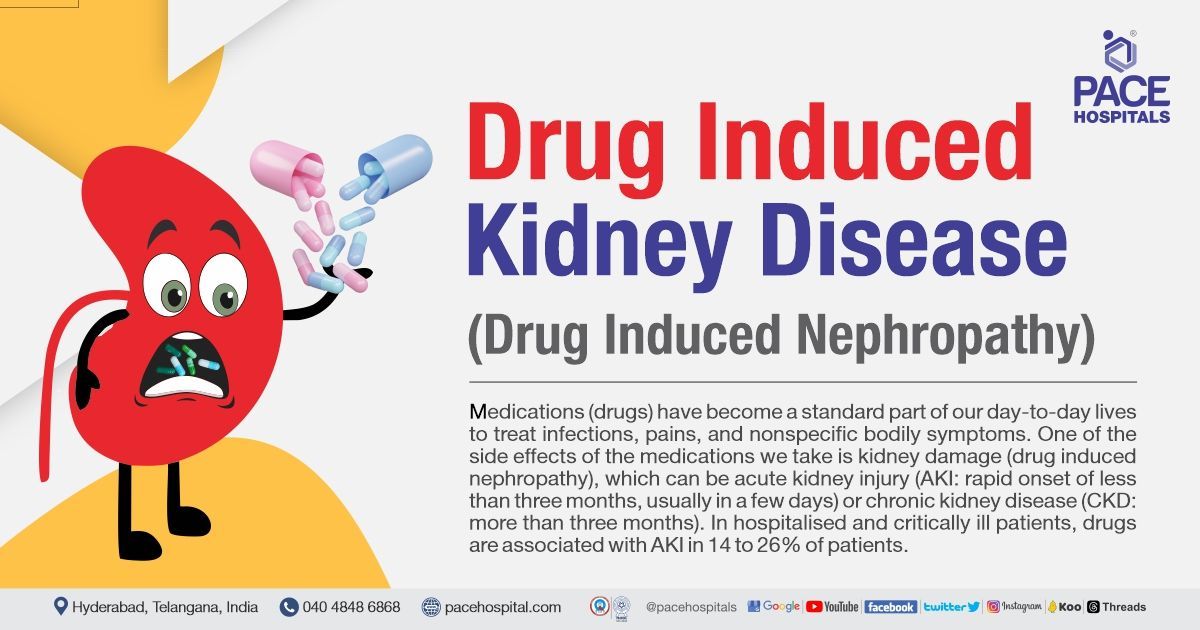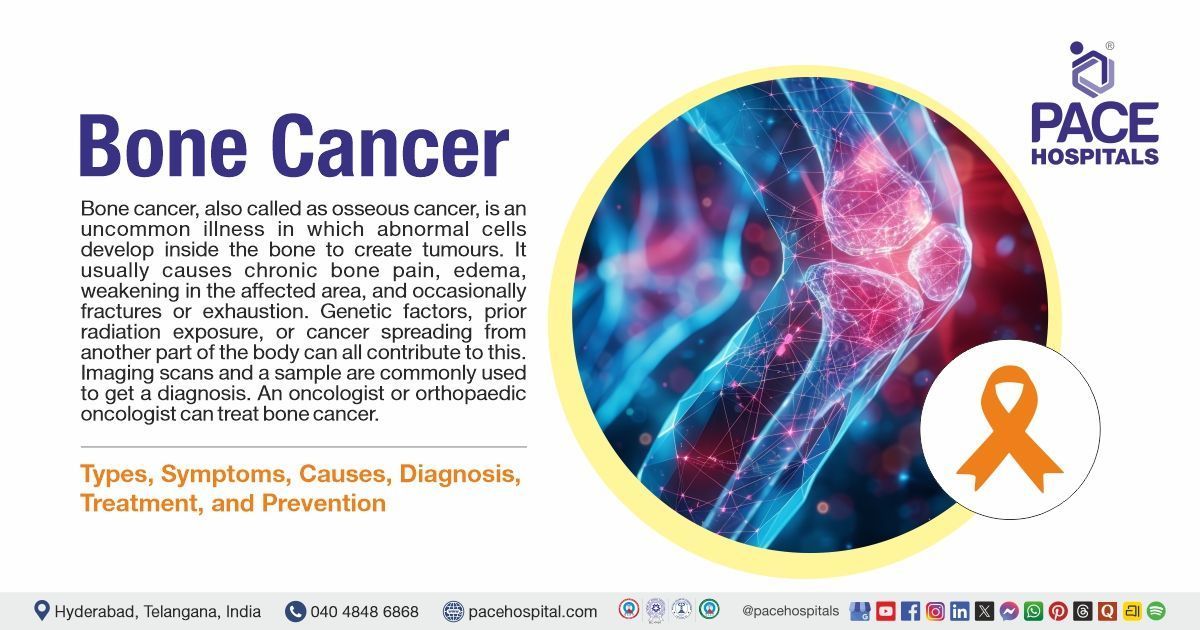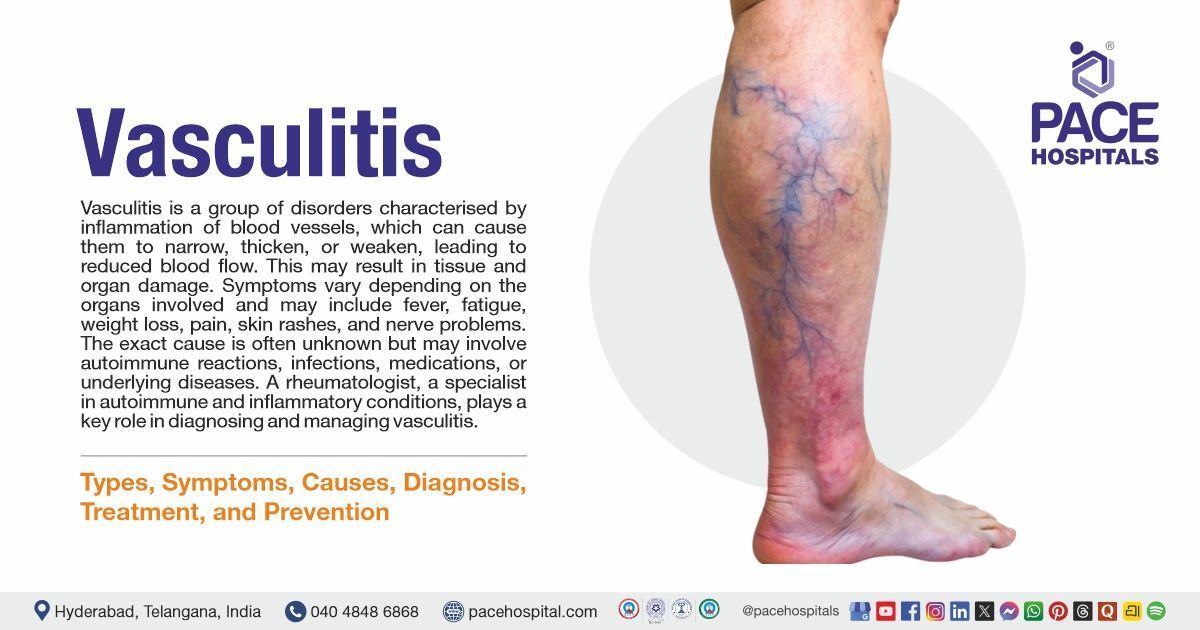Drug Induced Kidney Disease – Symptoms, Risk, Diagnosis, Treatment
Pace Hospitals
Medications (drugs) have become a standard part of our day-to-day lives. Over-the-counter medications are used to treat infections, pains, and non-specific bodily symptoms. But they do have their risks, which are essential to know to avoid the side effects. One of the side effects of the medications we take is kidney damage (drug induced nephropathy), which can be acute kidney injury (AKI: rapid onset of less than three months, usually in a few days) or
chronic kidney disease (CKD: more than three months). In hospitalised and critically ill patients, drugs are associated with AKI in 14 to 26% of patients.
Nephrotoxicity
Nephrotoxicity meaning
Nephrotoxicity, also known as renal toxicity, is a rapid decline in kidney functions due to the intake of medications or chemicals. These nephrotoxic agents are known as nephrotoxic drugs or renal failure drugs. There are several different mechanisms through which medications can cause damage to the kidneys (drug induced nephrotoxicity), such as thrombotic microangiopathy, glomerular injury, inflammation, renal tubular toxicity, and crystal nephropathy.
What are the medications that can cause kidney damage?- Drugs causing nephrotic syndrome
There are a large number of medications that damage kidneys (drug induced nephropathy). Following is a table that shows important groups of medications that are usually associated with kidney damage.
What is the mechanism by which these drugs can cause kidney damage?
To understand how these drugs can cause kidney damage, one needs to know the structure and functions of the kidney. Each kidney has around 10 lakh functioning units called nephrons. Each nephron has different parts that help in filtering the blood and forming the urine, among various other functions. The parts of the nephron are the glomerulus and the tubule. The glomerulus is a spherical structure in which the blood is filtered to produce the filtrate, which is released into the tubule. The tubule has various segments which help in ultimately forming the urine.
One of the primary functions of the kidney is the elimination and metabolism of the drugs in the body. Many drugs are excreted out of the body through urine, so they have to cross the kidney for the same.
Along with the excretion of drugs, the kidney also metabolises many drugs. During metabolism, drugs are converted from their active form to inactive forms and sent out of the body. These functions of the kidney lead to exposure to the many drugs that one consumes.
Drugs that are consumed can damage the kidneys in a variety of ways.
Acute tubular injury: Many drugs can directly damage the tubules of the nephrons. Tubules may be damaged by the direct effect of the drug or its metabolites. Drugs can cause damage to components of tubular cells, leading to their death. Simultaneous consumption of other medications that can cause kidney damage increases the risk of tubular injury. Damage to the tubules can lead to abnormal blood electrolyte levels (sodium, potassium, magnesium, calcium). Acute tubular injury is usually dose and duration-dependent. It means when the causative drug is exposed in higher doses and for a longer duration, the risk of kidney damage increases.
Medications that usually cause the tubular injury type of kidney damage are antibiotics (amikacin, vancomycin, colistin), antifungal drugs (amphotericin), anti-viral (tenofovir), NSAIDs (ibuprofen, aceclofenac, etc.), chemotherapy drugs (cisplatin) and immunosuppressive medications (tacrolimus and cyclosporine).
Acute interstitial nephritis: acute interstitial nephritis is a type of allergic reaction in the kidney to the drug. Common allergic reactions are of skin and upper respiratory tract, which can present like skin rash, itching, runny nose, or cough. These types of reactions develop when the patient gets exposed to an allergic agent. Similarly, the drugs consumed can act as allergic agents inside the kidney by depositing in them. The body's immune system gets activated, and immune cells accumulate around the drug molecules in the kidney tissue and cause damage to the kidney. This type of kidney damage is idiosyncratic (unique) and is not dose or duration-dependent. Even a smaller dose and one-time exposure can cause damage to the kidneys.
Examples of the common drugs that can cause acute interstitial nephritis are antibiotics (penicillin, cefixime, cefpodoxime), antiacid drugs (pantoprazole, omeprazole), Pain killers (NSAIDs like ibuprofen, diclofenac), diuretics (furosemide, hydrochlorothiazide), anti-virals (acyclovir, indinavir), anti-seizure medicines (phenytoin, phenobarbital, carbamazepine), lithium and allopurinol among many others.
Crystal formation in tubules: Some of the drugs can precipitate in the tubules of the nephron, forming crystals that cause tubular damage and blockage. By damaging the tubules, it will lead to inflammation in the kidney, which will further worsen the kidney function. Some of the drugs that can form crystals are antibiotics (sulfamethoxazole, ciprofloxacin, amoxicillin) and anti-viral agents (acyclovir, indinavir), oral phosphate as a laxative.
Decreased blood supply to glomerulus: A few drugs can lead to decreased kidney function by decreasing the blood supply to the glomerulus of the nephron. This type of damage is usually reversible if identified early and the medication dose is reduced or stopped. Examples of the drugs causing this type of kidney damage are Angiotensin-converting enzyme inhibitors and angiotensin receptor blockers (telmisartan, losartan, olmesartan, ramipril, enalapril), NSAIDs (pain killers like ibuprofen, diclofenac), SGLT2 inhibitors (Dapagliflozin) and calcineurin inhibitors (cyclosporine and tacrolimus).
What are at risk of kidney damage with drugs?
There are a few risk factors that can increase the risk of drug-induced kidney damage (kidney damage from drugs), especially from drugs that damage the tubules by tubular injury. Allergic reactions leading to interstitial nephritis are unpredictable. Some of the risk factors are as follows:
- Patients admitted to hospital
- Older age
- Patients already suffering from chronic kidney disease (CKD)
- Dehydration states (excess vomiting, loose motions)
- Exposure to multiple nephrotoxic drugs (medications that can damage kidneys)
- High dose and longer duration of the drug use
- Diabetes mellitus
- Liver disease
- Heart failure
- Sepsis (due to infection)
- Genetic factors
What are the symptoms of kidney damage due to drugs?
Drug-induced kidney disease symptoms
Drug induced kidney disease or drug induced nephropathy usually won't cause any noticeable symptoms or signs. Rarely, allergic reactions to the drugs can cause fever and rash over the body. Some of the signs and symptoms which can suggest kidney disease are:
- Decreased urine output
- Swelling of legs, body
- Fatigue
- Loss of appetite
- Vomiting
- Confusion
- Shortness of breath
How is the drug induced kidney disease diagnosed?
Drug-induced kidney disease diagnosis
In patients with drug induced nephropathy, other than clinical symptoms, which are usually less prominent, laboratory tests help identify the kidney damage. There will be an elevation in creatinine value in the blood, and complete urine examination will sometimes show loss of protein, blood, or white blood cells in the urine. Drugs as the culprits of kidney damage are identified by considering the following factors.
- Recent use of the drugs (nephrotoxic agents) which can cause kidney damage.
- If any risk factors can increase the risk of kidney damage, as mentioned above.
- Ultrasound examination revealed normal kidneys and urinary tract.
- Sometimes, patients may have fever and rash due to allergic reactions to the drug.
- Urine may show crystals of the drug, which can damage the kidneys
- If none of the above factors gives clarity about the cause of kidney damage, then a kidney biopsy is done, which will give the diagnosis.
What is the treatment of drug induced kidney disease?
Drug-induced kidney disease treatment
After identifying the drug as the cause of kidney damage, the first and foremost thing a nephrologist does is to assess whether that drug can be stopped or not. Stopping the drug is the first and most crucial step in treating drug-induced kidney disease. If there are better alternatives that can be given, then the drug is stopped. If an excess dose of the drug causes kidney disease, then the dose is adjusted according to the patient's kidney function, and usually, the kidney recovers.
Stopping the drugs which cause tubular damage will lead to recovery in the tubules. In the case of interstitial nephritis, which is an allergic reaction, stopping the drug also leads to improvement in kidney function. If the improvement in kidney function is not adequate or not seen, then medications like steroids are given to the patient. Steroids are only given to patients if the kidney damage is due to an allergic reaction to the drugs. Steroids won't work if they are given to patients having tubular damage mechanisms or crystal formation.
What are the precautions to be taken to prevent drug induced kidney damage?
The best way to prevent kidney damage from nephrotoxic drugs is to avoid unnecessary over-the-counter medication use of nephrotoxic antibiotics and painkillers. This is more important in patients who are having the risk factors. Sometimes, drugs are necessary to treat the medical conditions. Some of the tips to follow are:
- Informing the treating doctor about the intake of all the patient medications, along with alternative medications like ayurvedic or homoeopathic medications.
- Proper dosing of the drugs based on kidney function can decrease the risk of kidney damage.
- Stay hydrated adequately
- Monitor kidney function as advised by the doctor
- Report to the doctor immediately in case of any new symptoms
FAQs - Frequently asked questions on Drug induced kidney damage
Share on
Request an appointment
Fill in the appointment form or call us instantly to book a confirmed appointment with our super specialist at 04048486868











